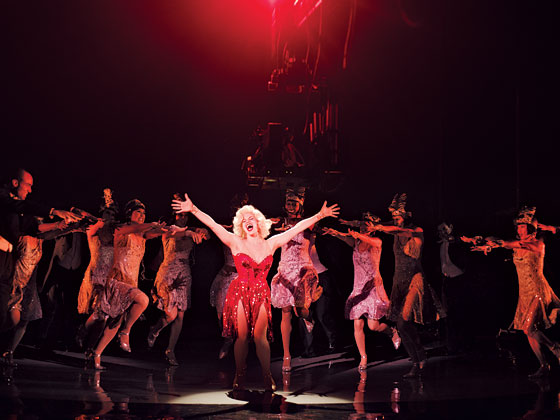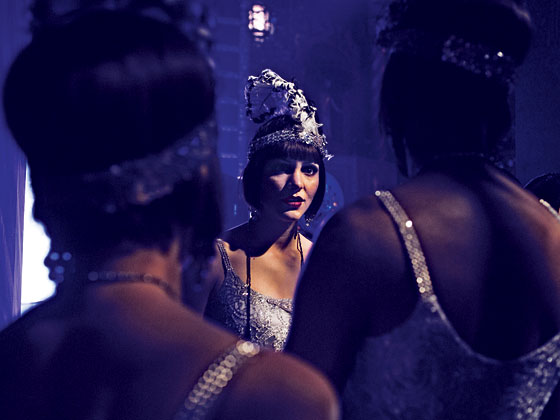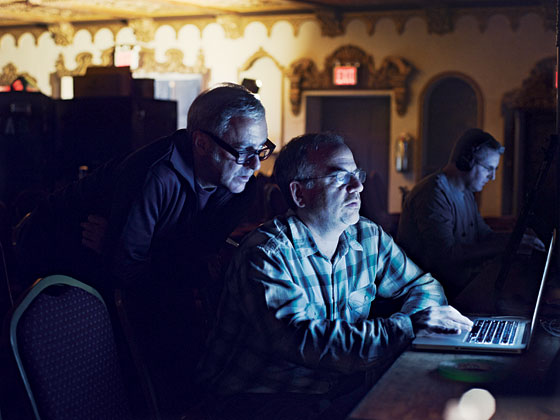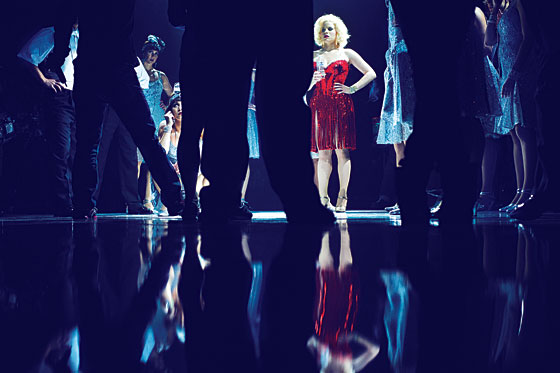
Baroque beyond belief and gilded to its gills, the St. George Theater on Staten Island, a vaudeville palace when it opened in 1929, has fallen on hard times. However eye-popping the interiors, it looks from the street, where a crumbling stucco marquee scowls overhead, like a porn theater at best, or perhaps the future site of an Applebee’s. These days, it’s often rented as a set for movies and TV shows that need to simulate a Broadway house, and so, on a foggy morning in November, the new NBC series Smash, which shoots most of its big production numbers here, has occupied the premises. As technicians adjust the dolly crane for a number called “Let’s Be Bad,” chorus boys in tailcoats and lithe girls encrusted with spangles wander about in the inky dark, giving the impression of some outer-borough revival of Follies.
Except that Follies is about the death of the American musical, while Smash, which debuts on February 6, is banking on its viability. And that’s just the first of the paradoxes in store. Consider that the show, in which a bunch of fictional theater types set out to write a serious musical about Marilyn Monroe, was largely created by actual theater types—the playwright Theresa Rebeck, the director Michael Mayer, and the songwriters Marc Shaiman and Scott Wittman—whose up-and-down reception on Broadway of late might lead some to expect a poison-pen letter. But no, it’s a love letter: a romantic-dramedy musical soap opera that borrows elements of reality TV in focusing, at first, on the competition between two actresses to play Marilyn. If Smash is successful and gets renewed, the Marilyn musical should reach “Broadway” next winter—much faster than a real production would. But, even stranger, if the Marilyn musical is itself successful, producers hope to crack it out of its Smash shell and move it to the actual Broadway sometime thereafter.
That’s two jackpots with one ticket—but let’s not put the meta-cart before the meta-horse. For one thing, if this Marilyn musical existed sans Smash, it might never get produced. An earlier attempt at a Broadway Marilyn, featuring a happy ending, was a huge bomb in 1983; Frank Rich called it “incoherent to the point of being loony.” Also, as the Smash creators well know, original musicals, particularly the most ambitious ones, face bad odds in the current market. (The Book of Mormon, a comedy, is the exception that proves the rule.) Almost all 40 Broadway houses are booked, but with what? “Revivals! Movies!” complains Debra Messing within the first three minutes of the Smash pilot. (She plays the lyricist half of the songwriting team.) “Why doesn’t anyone do new musicals anymore? New book! New songs!”
For Shaiman and Wittman, golden boys of Hairspray fame, the contrast between the two worlds—the theater and its televised simulacrum—is particularly piquant. They began the bulk of their work on Smash, for which they are writing the original songs, just as their Broadway show Catch Me If You Can, after six years in development, was being pushed by critics into an untimely grave last summer. If they are still smarting from that, they don’t let on. “Smash was a very nice thing to turn to in the midst of Catch Me’s falling,” is all Wittman will say. “A very nice thing to be caught by,” adds Shaiman.
So far they’ve written thirteen songs for the show, with smart hooks (“Never Give All the Heart” takes its title from Yeats, whom Monroe read assiduously), playful lyrics, rhythmic vigor, and a Jule Styne sheen. But they’re more complicated than most theater songs in having to do double or triple duty. Shaiman calls them Rubik’s Cubes. “Let’s Be Bad,” he says, is not just a Charleston about “an actual moment in Monroe’s life when she was misbehaving” on the set of Some Like It Hot. “It’s also a moment where the characters in Smash are misbehaving”—particularly Ivy Lynn, one of the women competing to play Marilyn. And while it has to fit seamlessly into that narrative as theater songs do, it has to work as a movie song as well, supporting a huge choreographic enterprise that can be completely entertaining in no context at all. In other words, says Shaiman, “it has to pop on TV.”
Whether it does or not, I can’t say; I appear to be the only one listening to it live. Well, semi-live. Though the track is actually prerecorded, Megan Hilty, who plays Ivy, is belting to the back of the house; she tells me later that she does this to produce her authentic “singer face.” Similarly, the staging is designed to look good in the frame of a proscenium, even though a television screen has none. It’s a mille-feuille of illusion, which may be why everyone but me is huddled like cavemen around fires in what they call “video villages”: clusters of monitors with earphones attached so they can experience the number as viewers will. “Who cares about the actual stage image?” says Wittman. It’s very confusing being in a theater watching the filming of a TV show in which an actress playing an actress is having a fantasy of playing a character in a stage musical about a movie star in a movie musical. “Have I missed any levels?” I ask Rebeck when I find her wrapped in scarves by a monitor.

“Welcome to Inception,” she says.
It began, oddly enough, with Steven Spielberg, who in September 2009 called Bob Greenblatt to talk about a TV idea he’d long harbored. Each season would feature the creation of a new musical, and—here was the kicker—if any of them turned out to be stageworthy, he’d like to mount them on Broadway. Greenblatt was then president of entertainment at Showtime Networks, but he had an undergraduate degree in theater and had just produced (and closed at a loss) the musical 9 to 5. His reaction was: “Are you me calling me?” It was, he says now, “the perfect thing I would want to do.”
Spielberg himself was not previously known as a theater lover. Aaron Sorkin’s 2007 drama The Farnsworth Invention is the only Broadway production for which he is listed as a producer, but according to Greenblatt he’s invested anonymously in many others. In any case, after Greenblatt agreed to house the production at Showtime, he called in producers Craig Zadan and Neil Meron, whose work putting musicals on television (the Bette Midler Gypsy, Annie) and film (Chicago, Hairspray) had basically revived those genres. Zadan and Meron immediately suggested Shaiman and Wittman to write the songs, and only a few days after the initial meeting with Spielberg, the deal was announced in Variety.
But what kind of show would it be? Musical dramas on television were usually botched affairs: Cop Rock lasted eleven miserable episodes in 1990; Viva Laughlin eked out two in 2007. Nor was Glee, which had just started its first full season that September, what Spielberg imagined. Rather, his models were The West Wing and Upstairs, Downstairs. He wanted Smash (the name came from Garson Kanin’s novel, which DreamWorks optioned just for its title) to be an absolutely authentic depiction of an arcane world. Yet he wanted it to be universal, says Zadan, not a niche show like Entourage or one you’d “only watch if you already loved Broadway.” To create it, Zadan and Meron suggested Rebeck, a much-produced playwright (her comedy Seminar is currently doing well on Broadway) and a writer-producer on such series as NYPD Blue and Law & Order: Criminal Intent.
“The first job,” Rebeck says, “was to choose the subject of the musical within the show. I wanted something with feathers and swords, but Scott and Marc said no.” (“We don’t do feathers,” Wittman explains.) Wittman came up with the idea of a sweeping bio-musical about Monroe, from Norma Jeane to tabloid tragedienne. “She stands for so many things that people in showbiz go through,” he says, “and she’s so iconic that you can just drop her into a situation and the audience will already know what’s going on. You don’t have to do a lot of explaining about who Joe DiMaggio or Arthur Miller are.” Shaiman demurs: “I’m not sure that 15-year-old girls know who Arthur Miller is.”
It soon became clear that in order to write Smash, the musical within it would have to be more than a notion. In a micro-development process one day in June, Shaiman and Wittman sat down with Mayer and Rebeck and hashed out a template for the Marilyn show on a dry-erase board, including the placement of eighteen songs (not all of which will necessarily get sung on Smash). There’s no script, but Mayer, who directed the pilot and two other episodes so far, and whose job includes conceptualizing the musical within the musical, says that with the songs and the staging partly in hand, as well as the tone and approach, they are well on their way toward a producible work.
Meanwhile, Smash itself was progressing. Early on, Rebeck figured out how to resolve Spielberg’s potentially contradictory parameters: How could a story be both authentic to the theater world and yet universal? Her solution was to make one of the Marilyn wannabes a novice from the Midwest, through whose eyes the audience would experience the Broadway story. (That character is played by Katharine McPhee, the 2006 American Idol runner-up; the other, played by Hilty, is a Broadway veteran itching to break through.) This choice established the show’s rhythm of alternating making-of-a-musical scenes with offstage domestic dramas. The pilot includes three original numbers as well as a cover of the Christina Aguilera hit “Beautiful”—part of a strategy to extend the show’s brand to iTunes. (Glee also covered “Beautiful” in its first season.) In between, it unwraps the story of the songwriting team played by Messing and Christian Borle (she’s trying to adopt; he’s trying to get laid), the producer played by Anjelica Huston (a messy divorce has put her revival of My Fair Lady in escrow), and the two actresses (who face a lecherous director).

Rebeck’s framing also solved a deeper aspect of the authenticity problem, one that Glee struggles with: Why are people singing? And although everyone involved with Smash has learned to say that the success of Glee “opened the door” for them, the new show runs through that door as if to escape a house on fire. Smash is not about high-schoolers but about sophisticated (if childish) theater types: people who actually do sing in hallways and live dramatic lives. Most of the music therefore arises, as Spielberg instructed, from singable situations, even if some songs eventually take on a fantasy dimension. Or vice versa. The pilot climaxes with a duet for the competing actresses called “Let Me Be Your Star,” which moves from each woman’s apartment through the streets of New York with the thrill and propulsion of “Don’t Rain on My Parade.” Only at the final stanza, when they arrive at an audition studio, do you realize it’s their callback song.
Of course, authenticity is relative. There is no Park Slope brownstone—not even Rebeck’s—as wide as the one Messing’s character lives in. The show within the show is naturally even less naturalistic, although Rebeck says her idea of a trio in which Miller, DiMaggio, and JFK sing about what they look for in a woman was shot down by Shaiman and Wittman. “ ‘When would those men be together?’ they asked. And I said, ‘I don’t care, it’s a musical!’ ”
Rebeck maintains that authenticity is not the same as realism, which is why the Marilyn musical sprints from conception to out-of-town tryout in the equivalent of fifteen weeks. (The original plan of one musical per season was rejiggered when Greenblatt moved to NBC, bringing Smash with him but scheduling it as a February replacement.) If the series is picked up for fall, a new, completely different musical will gradually enter the story line while Marilyn is mounted and the process begins again.
Though the pilot was shot in various real New York locations, once the series was greenlit, NBC built sets to replicate them exactly. At the main shooting stage in Long Island City, the results are arranged like pieces of a jigsaw puzzle. One character’s bedroom leads to the bathroom of another; the composer’s Upper West Side hallway feeds into the foyer of the producer’s Times Square office. On that foyer wall are posters for previous musicals (Three on a Match, No Parking, Heaven on Earth) written by Messing’s and Borle’s characters. And on the posters, posing as credits, are the names of Smash crew members. Welcome to Inception, indeed—and yet even more disorienting are the simpler sets at the Smash production facility in Greenpoint, including a “rehearsal studio” that uncannily reproduces the exact weary blankness of a real one. As Rebeck leads me on a tour, I find I can’t tell the difference between rooms created for filming a show about actors and rooms used by the actors playing them. Is that bathroom functional? “Probably,” she says.
Rebeck is not known for uncertainty. She is sometimes called, behind her back, “the Queen.” (A sign on her Greenpoint office door reads LEAVE HER ALONE.) She says the job requires “a general, not a politician,” so even though she has a writing team heavy on playwrights, including executive producer (and former Brothers & Sisters showrunner) David Marshall Grant, she wrote about half of the first season’s scripts herself.
“Writers’ rooms really are not my thing,” she says, “because I can only stand being in a room with people so many hours a day. And I feel like early drafts should be speedy because everyone changes their mind, so why spend a lot of time up front parsing sentences?” In the month before filming began, they banged out the first eight episodes.
“Really, we had to. A lot of TV shows get behind the eight ball, and I knew that if this one did, it would collapse. I don’t think chaos is a fertile stew. I’ve had to keep explaining that making a musical and making TV are each crazy processes but not the same crazy process. To make this work, you’ve got to stay way ahead. With these big numbers, you’ve got three trains on three tracks: the song itself, which Marc and Scott need time to write; the staging, which has to be rehearsed for weeks; and the story they fit into. And they all have to come into the station at once.” Most under the gun is choreographer Josh Bergasse, who at all times, he says, has one number “in my ear, one in rehearsal, and one shooting.” Or, as Zadan puts it, “It’s like producing Chicago every week.”

With so much riding on Smash for fourth-place NBC—the pilot alone cost a reported $7.5 million—it’s amazing no trains have crashed. Still, there is tension. Greenblatt, nervous that the show “could be considered a little rarefied,” has doubled down by premiering it the day after the Super Bowl, with major promotions throughout the game, and giving it just about the only strong lead-in available: last season’s hit singing contest The Voice. Meanwhile, Spielberg, even while filming the movie Lincoln in Virginia, sometimes watches live shoots by video feed and makes suggestions. The New York team feels it’s being monitored by God—or, as Greenblatt puts it, “like Michelangelo is painting your family room.”
“Look,” says Rebeck. “I’m well aware of NBC’s desperate need for a hit, and I’m not afraid of it. I’m perfectly capable of delivering that. Where I do get scared is when they ask me to do things they don’t understand, like constantly shoving the story toward big cathartic, climactic moments. Now, sometimes that’s not a bad idea; I’m interested in that in my plays. And sometimes it is a bad idea, and we come to blows. But the bottom line is they have tremendous respect for us: I mean, they put a whole bunch of theater artists at the top of this show for a reason.” In particular, they gambled on Mayer, who had zero TV experience but produced a pilot that left the producers jubilant.
“I’m sure they think we’re nuts,” Rebeck adds. “But I think that, too. We are nuts. Theater people are different. They have a passionate and gracious volatility. That’s why we’re writing about them! I think of how much love there is in the musical theater: The best musicals open our heart with joy. So you focus on that.”
She seems momentarily to have forgotten Michael Riedel, the theater gossip described in the pilot as “a Napoleonic little Nazi who works for the Post.” Perhaps as an inoculation, she wrote a scene for him in episode nine. (“I was brilliant,” he says.) Rebeck seems to be good at finessing, or rationalizing, the small stuff. When NBC asked for a fifteen-second change she didn’t like, she actually lay in bed and calculated what percentage of fifteen episodes, each running 43:15, the change would represent. “And do you know what it was?” she exclaims. “It’s .0004 percent! Why are we getting bent out of shape about this? Who gives a shit?”
Actually, it’s .04 percent, but point taken. Compared with the potential rewards, the annoyances are negligible. Greenblatt says the show’s ad-time is already sold out for its first quarter. It’s also a promising sign that “everyone in the world,” as Zadan puts it, wanted to be on the series; upcoming guest stars include Uma Thurman, Nick Jonas, Norbert Leo Butz, and Bernadette Peters. And though agents usually warn clients off pilots, the Smash team had no trouble casting theirs. Messing, a lifelong theater geek who played Annie in high school, says she jumped at the chance. “A script like this,” she says, “doesn’t come around, well, ever.”
But cynics—or are they realists?—have for decades maintained that the musical theater is no longer capable of bridging the divide between popular and serious culture and that the reason is the audience. For Zadan and Meron, the problem isn’t the audience but the delivery system. “It’s so old school to think that musical theater is not a popular form of art,” says Meron. “What are Cats and Phantom and Wicked and Mamma Mia! and Jersey Boys? I say it’s the other way around: Theater isn’t as rarefied as it used to be. It’s more popular. It’s just that people in glass towers are not seeing how deeply theater has penetrated the culture.”
Rebeck agrees. “I grew up in the Midwest, and we all did plays in high school. Anything Goes, and everybody went. Theater is more a natural part of people’s lives than is generally acknowledged. We’ve already seen on reality TV and Glee that girls bursting into song is something people want to hear. It’s just that the theater has gotten too precious. And there’s a certain sort of culture that fell in love with irrelevant theater. It didn’t matter whether it reached its audience or not: It had an internal poetry. That’s nice, but theater at its best invites people in. And this show tries to do that too.”
The biggest musicals today recycle existing elements of the culture that audiences are already familiar with: stories they’ve heard in other forms, songs they know backward before the curtain goes up. Individual works may be entertaining and even succeed, but overall the theatrical culture gets stale, craft declines, and artists with higher aspirations lose hope. Perhaps the road out is like the one Megan Hilty describes. Like Ivy, she came to New York with one thing on her mind: to succeed in musicals. Now, at 30, she can’t even count how many times she’s been told after readings and workshops of Broadway-bound shows: We love you, you’re perfect, but we have to find a star to play this. “Which is devastating,” she says. “So I finally told myself, if people are looking for TV stars, I can sit around and cry about it or I can go develop a career in that field and then come back and do what I want.”
Smash, if it succeeds as no such show has previously managed, may test the same proposition. Put high-quality, original musicals on TV, let people learn to love them, and then bring them—the musicals and the audience—back to Broadway. Spielberg may have inadvertently (or advertently; who knows with God?) come up with something that’s more than a way to entertain and make money. He may have stumbled on a way out of Broadway’s lowest-common-denominator business model.
I test this idea on Mayer two days after his serious-minded revisal of On a Clear Day You Can See Forever opens to gleefully vicious reviews. “Sing it, sister!” he says. If only it were that easy.